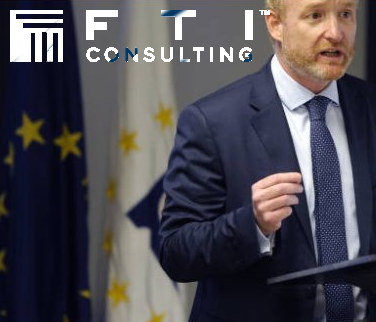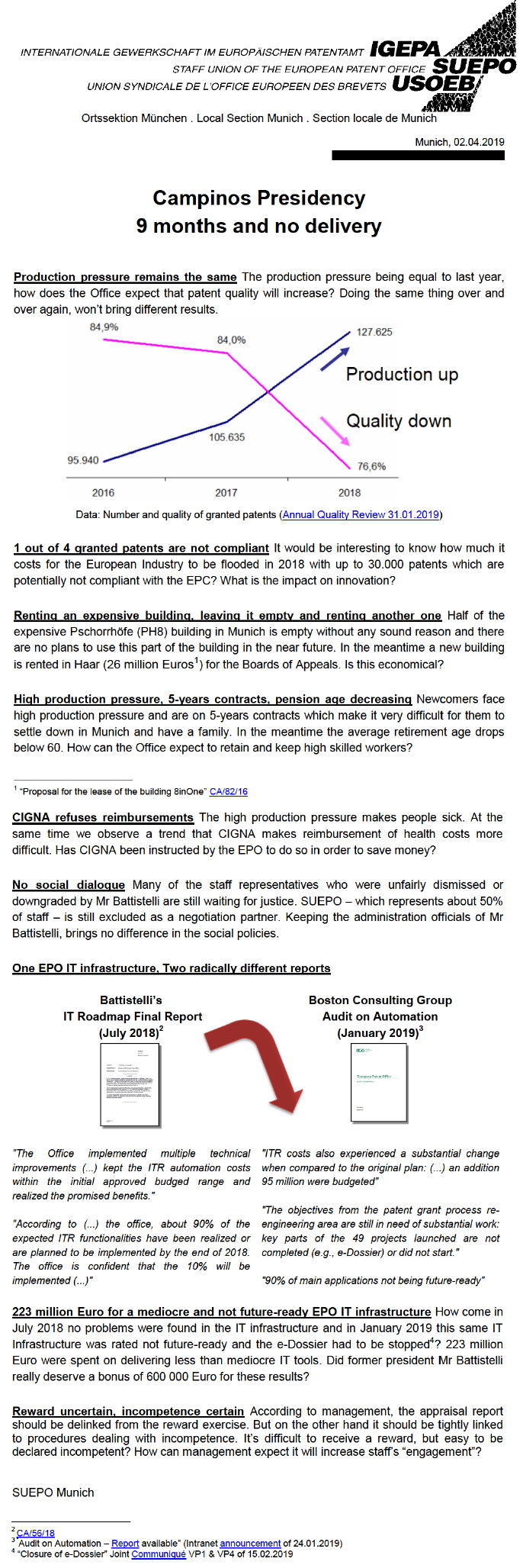

We wrongly assumed that the very worst had been left behind. But Europe's second-largest body is bribing academia still, under the new and 'improved' President. This isn't about supporting science and/or education. We consider that to be a form of 'soft' bribery, kick-started yet again for bogus, biased 'research' that serves as ammo for corrupt EPO management that keeps violating the law. The EPO has tweeted about it again, framing it as some sort of 'charitable' endeavour. This is something Battistelli did a couple of years ago. He had done similar things beforehand and also paid EPO budget to universities in the UK and the US (yes, even outside Europe) to produce UPC lobbying material. It was so grotesque that we wrote many articles about that at the time. Such EPO-sponsored 'studies' help distract from independent and honest ones. Even the media is being bribed for 'studies', so can it cover EPO scandals anymore?
"Notice the growing number of buzzwords the EPO throws out there to justify granting patents in clear violation of the EPC."The same thing happens in the US because of the private sector (meddling in the affairs of courts and the USPTO), but here we have the European Patent Office (EPO) under António Campinos pushing toxic and likely illegal agenda such as software patents in Europe. How much longer can this go on and should it be permitted to go on?
News wires show us all sorts of newly-granted EPs that may in fact be "IPs" (invalid patents) or fake patents. We don't know for sure about every single domain, but software is our expertise and now we have another new article about "blockchain" patents that are actually just software patents. In "How Europe and China handle blockchain patents," published just now, Kirwin Lee of Haseltine Lake admits (in her own words and the EPO's own words that blockchain patents are just fake patents or IPs). Here are a few paragraphs, comparing the EPO's policy to China's (yes, China):
Blockchain inventions are regarded by the EPO as a type of computer implemented invention (CII). Mr Koen Lievens, Operational Director at the office, pointed out that in order to provide further legal certainty on the examination practice of CIIs, the Guidelines for Examination at the EPO have been revised thoroughly over the past three years on the basis of the case law of the Boards of Appeal.
The latest version of the Guidelines was published in November 2018, and its revisions include important improvements on guidance with regard to the eligibility of CII. The newest revisions are seen as the EPO’s attempt to establish a more harmonised and predictable approach across all computer implemented inventions.
[...]
In China, claims related to improved blockchain related algorithmic methods per se are not excluded from patentability, as long as they are defined as being carried out by a computer or a device (akin to EPO’s “first hurdle” as explained above). By contrast, pure algorithms, such as mining methods, would typically be refused under Article 25, which prohibits inventions for “rules and methods for intellectual activities”.
One of the major divergences between European and Chinese patent examination concerns the subject-matter that would be regarded as being “detrimental to public interests” (which is equivalent to “matter contrary to "ordre public" or morality as stipulated in Article 53(a) EPC).
This was demonstrated by way of a case study in the conference session, in which Ms Wang explained that inventions related to virtual currencies or cryptocurrencies (eg bitcoin) would be perceived as being detrimental to public interests for posing a potential threat to the stability of the nation’s financial and monetary system.
Since its crackdown on cryptocurrencies in 2017, the Chinese government has maintained a relatively strict stance on the financial use of blockchain technology. Accordingly, claims covering the application of blockchain technology in the financial domain would unlikely to be allowed under Article 5 of the Chinese Patent Law which stipulates that inventions that “harm public interests” are not to be allowed.
"Today's EPO is a very sordid mess that consciously grants IPs, invalid patents. Even the staff union admits so..."They also promoted patents on all things "blockchain", which sometimes means just some program with a database (may be distributed, but nothing particularly innovative and unprecedented there). They also returned to that the "SDV" nonsense in this other tweet: "A study by @EPOorg shows a sharp rise in #patent applications for self-driving vehicles in Europe."
A 'study'; they keep paying publishers and academics for bogus 'studies' that accomplish nothing except serve lobbying material to the EPO. They have also just published this 'news' about a lobbying event dubbed "medtech" (openly promoting illegal software patents, calling them "medical" and "for SMEs"). In their own words, with "CII" in the headline: (warning: epo.org link)
The EPO and the Swedish Patent and Registration Office (PRV) jointly hosted the first in a series of events on computer-implemented inventions in medical technology last week in Lund, Sweden. The conference, which focused on the importance of patents for small and mid-sized companies, was attended by participants and speakers from SMEs and start-ups, industry, universities, public research institutes, patent offices and regulatory bodies from over a dozen countries.
Medical technology was the field with the highest number of European patent applications last year, according to the EPO Annual Report 2018. As with many other technical fields, the impact of computer-implemented inventions is being strongly felt in this area. With this event, the EPO and the PRV aimed to raise awareness among businesses of the value of patents and IP strategies, and highlight how patent offices can contribute by providing the necessary knowledge and tools. Similar events are planned in other cities in Sweden and across Europe.
Over the last few years, the EPO Boards of Appeal have become more strict regarding the late filing of new facts, evidence or requests. The Boards are expected to become even more strict when the new Rules of Procedure of the Board of Appeal enter into force (possibly in early 2020).
A recent decision by the Board in T47/18 confirms that even under the current Rules of Procedure, parties before the EPO should not expect late-filed facts, evidence or requests to be admitted in appeal proceedings.
In the case under consideration in T47/18, the opponent only raised inventive step objections in their grounds of appeal. After the parties had been summoned to oral proceedings, the opponent then raised new lack of clarity and added-matter objections against claims that had already been considered during the opposition proceedings.
The Board exercised their discretion not to admit the new grounds into the proceedings, on the basis that new objections which were not raised in the of grounds of appeal are considered to be an amendment to a party's case.
In particular, the Board felt that the new submissions from the opponent went beyond the submissions serving to underpin the facts, evidence and grounds filed in good time, and were based on new legal grounds not previously addressed in the appeal proceedings.

Campinos Presidency, 9 months and no delivery. Published Tuesday by SUEPO, the staff union of the European Patent Office (EPO).